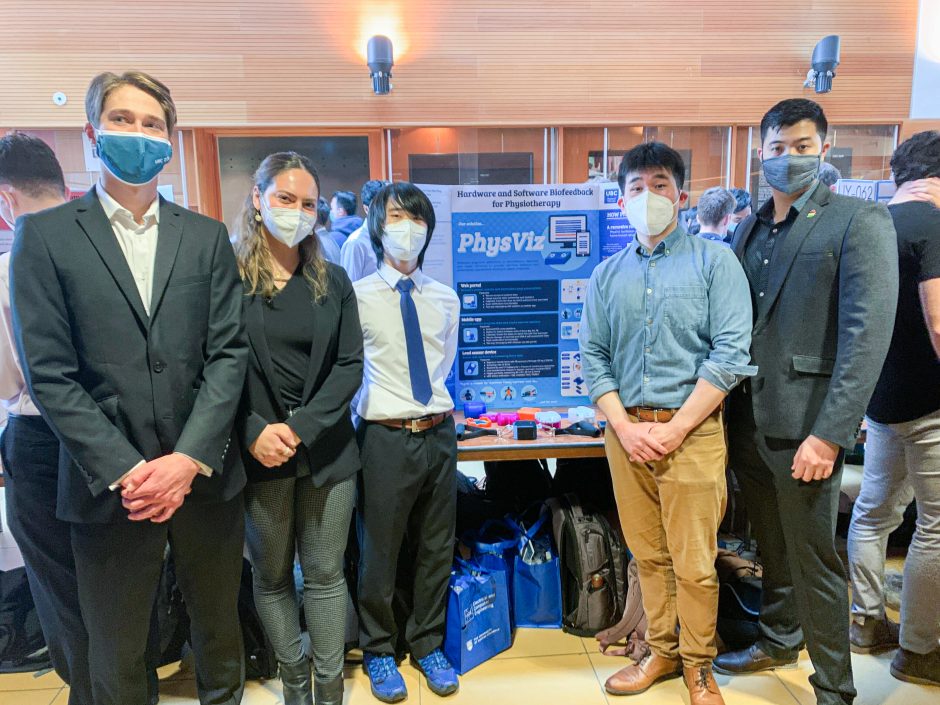
Join us in congratulating ECE undergraduates Warren, Stephanie, Gabriel, Hugh, and Jaiden for their accomplishment in receiving one of this year’s Faculty Awards at the 2022 Capstone Design and Innovation Day! We were able to connect with the team to ask about their work together on the capstone team, their excitement about their chosen project, and some of the challenges they were able to overcome together!
Which community partner did you work with?
The UBC Tendon Injury Prevention and Rehabilitation research group.
What would be the “elevator pitch” for your project (i.e., what is your innovation, what problem does it solve, etc.)?
PhysViz is an exercise-based telerehabilitation system. The package includes a Bluetooth-enabled load sensor and mobile application for providing biofeedback to patients, and a clinician-facing web portal for monitoring patients and updating exercise prescriptions.
The client’s system relied on an expensive dynamometer, so we developed a low-cost and scalable proprietary load sensor device from scratch. On the software side, in addition to user experience improvements requested by our client, we introduced exercise session tracking, self-assessment questionnaires, and direct messaging capabilities to the existing mobile app and web portal architectures.
What inspired you to pursue this particular project?
On a technical level, we pursued this project because we were interested in its hardware and software approach to assisting physiotherapy. Many current physiotherapy technologies are cumbersome, expensive, and often out of reach for most physiotherapy clinics creating a gap between the research realm and physiotherapists treating everyday clients. Given our diverse engineering backgrounds, we felt it was a good opportunity to address this biomedical issue through the generation of a novel and more accessible technology.
A number of us have also had experience struggling with rehabilitation either directly or through affected loved ones; those of us were eager to address a very relevant matter in our personal lives.
What was the biggest challenge you faced while working on your project?
With no load cell suppliers or printed circuit board fabricators in Canada, we had to outsource many of our hardware components overseas. International shipping incurred significant fees and several months in lead times, compounded by the global chip shortage and ongoing COVID-19 pandemic affecting supply chains worldwide.
We mitigated this by prototyping and testing in parallel with the lengthy delivery periods, using the aforementioned commercial dynamometer as a reference for our final design’s expected performance. By carefully managing our time and individual member expertise, we delivered a functional prototype on schedule.
What excited you the most about your project?
Besides exercising the skills and knowledge we gained during our studies, this project challenged us in fields and aspects of engineering less familiar to us.
Our hardware sub-team engaged in a supply chain throughout our printed circuit board sourcing and manufacturing process, load cell testing and calibration efforts, and mechanical design iterations. Lacking any prior practical knowledge in frontend and backend development at first, our software sub-team was also virtually thrown into the deep end; self-studying mobile and web app architectures turned out to be a stimulating experience, however.
This year in capstone has been an exciting learning opportunity overall.
What is the most interesting/surprising thing you learned while working on your project?
It was interesting to put our previous internships and personal hardware and software project experiences into practice to develop a fully functional prototype for our client. Sourcing components was surprisingly difficult; we didn’t expect to take almost two months of searching before finally coming across an s-type load cell fitting our client’s form factor constraints and performance specifications.
What does the future hold for your project?
Although remote physiotherapy is not a new idea, PhysViz is a novel concept never before seen on the market.
PhysViz still has a ways to go before it is fit for wide-scale clinical use. For one, a rechargeable battery circuit could elevate the load sensor device’s efficiency and ease of use. The mobile and web apps could also use better backend security, and gamification features would help to maintain active patient engagement.
We look forward to seeing how far our client and their future capstone teams take PhysViz.